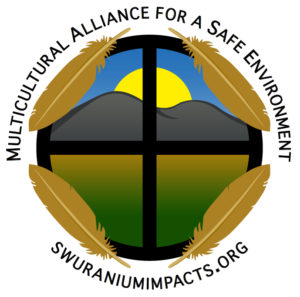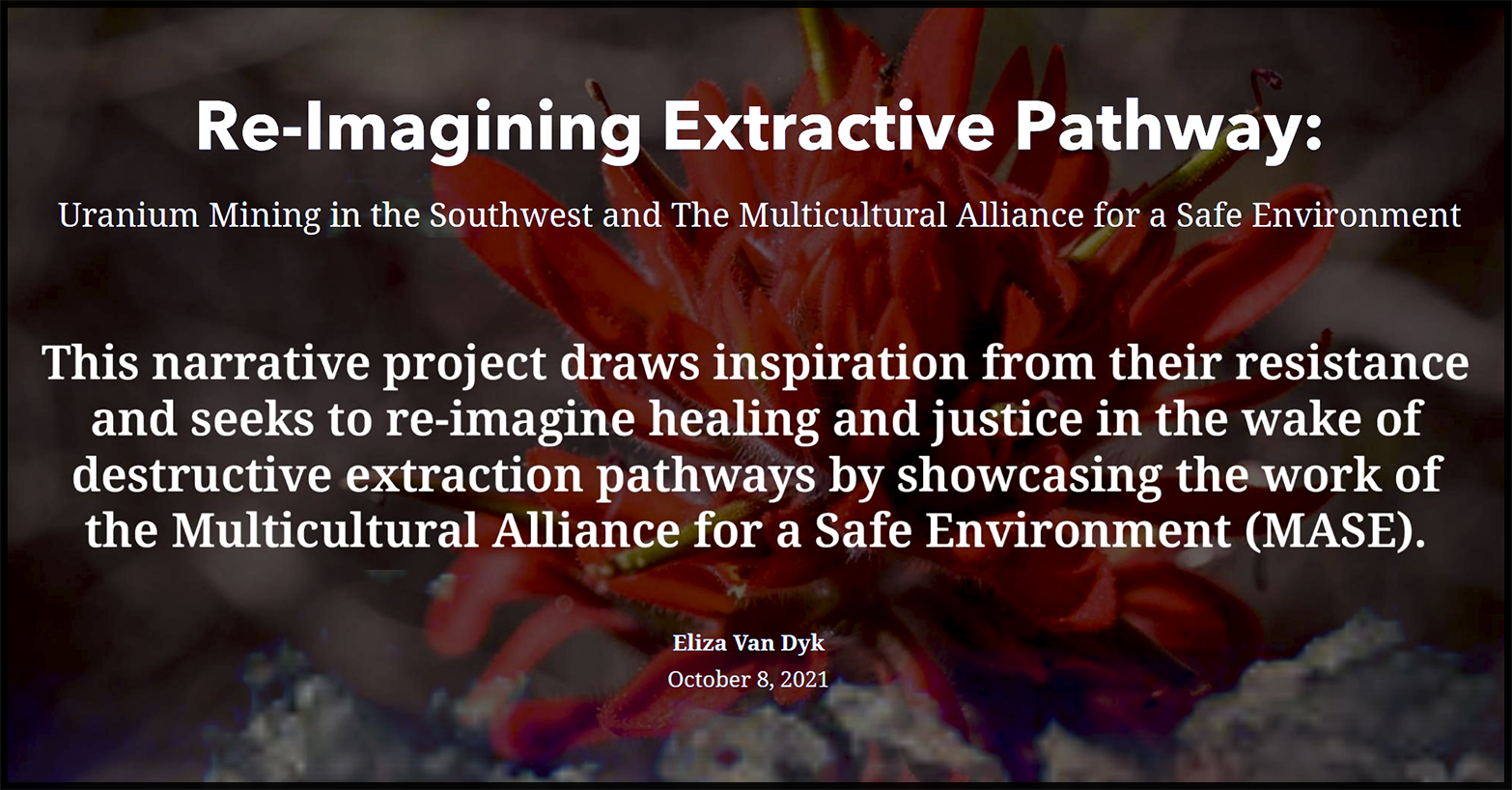23.05.09 NGO Letter to Oppose Mining Regulatory Clarity Act
Earthjustice • The Wilderness Society • Earthworks • League of Conservation Voters • Center for Biological Diversity • Natural Resources Defense Council • Sierra Club • Southern Utah Wilderness Alliance • Defenders of Wildlife • Hispanic Access Foundation • Alaska Clean Water Advocacy • Alaska Community Action on Toxics • Alaska Wilderness League • Anthropocene Alliance • Arizona Faith Network • Arizona Mining Reform Coalition • Arizona Trail Association • Black Hills Clean Water Alliance • Californians for Western Wilderness • Cascade Forest Conservancy • Citizens Awareness Network • Citizens to Protect Smith Valley, NV • Clark County Adventure Riders (NV) • Coalition for Wetlands and Forests • Conservation Northwest • Cook Inletkeeper • Dot Lake Village • Endangered Species Coalition • Friends of Buckingham • Friends of the Kalmiopsis • Friends of the Sonoran Desert • Gila Resources Information Project • Great Basin Resource Watch • Great Bear Foundation • Healthy Environment Alliance of Utah (HEAL Utah) • Idaho Conservation League • Idaho Rivers United • Information Network for Responsible Mining • Kahtoola, Inc • Kalmiopsis Audubon Society • LEAD Agency, Inc. • Living Rivers • Los Padres ForestWatch • Malach Consulting • Mother Kuskokwim Tribal Coalition • Multicultural Alliance for a Safe Environment • Native Movement • Nevada Conservation League • New Mexico Environmental Law Center • Northern Alaska Environmental Center • Northern Front Range Broadband of Great Old Broads for Wilderness • Norton Bay Watershed Council • Okanogan Highlands Alliance • Oregon Natural Desert Association • Patagonia Area Resource Alliance • People of Red Mountain • Physicians for Social Responsibility Pennsylvania • Progressive Leadership Alliance of Nevada • Public Citizen • Quiet Use Coalition • Save the Scenic Santa Ritas Association • Save the South Fork Salmon, Inc. • Silver Valley Community Resource Center • Sky Island Alliance • Soda Mountain Wilderness Council • Standing Trees • The Alaska Center • The Clinch Coalition • Trustees for Alaska • Tucson Audubon Society • Uranium Watch • WaterLegacy • Western Mining Action Network- Indigenous Caucus • Western Shoshone Defense Project • Western Watersheds Project • Wild Arizona • Wisconsin Mining Impact • Xplore Outside
May 09, 2023
Senators & Representatives,
On behalf of our millions of members and supporters, the following 78 conservation, climate, Indigenous and tribal-affiliated organizations call on you to oppose S. 1281 and H.R. 2925, the so-called “Mining Regulatory Clarity Act.”
The Mining Regulatory Clarity Act represents an unprecedented, de facto giveaway of America’s cherished public lands to mining corporations, upending and reversing over one hundred years of public land law precedent. Under the bill, anyone—for a nominal fee—gains permanent rights to occupy land, construct massive waste dumps, and build roads and pipelines across public lands to the detriment of all other values. This would preclude all other types of development and use, including renewable energy projects, recreation, and traditional cultural uses.
The Mining Regulatory Clarity Act is not a return to “status quo” as some proponents have argued. Instead, this legislation undermines the federal government’s long standing authority to safeguard public lands, threatening the protection of irreplaceable cultural, environmental, water, and economic resources. That’s because the bill conveys mining claimants (including international mining conglomerates) with a right to permanently occupy federal public lands. If an alternative use—like an electric transmission line or a renewable energy project—needed to cross “claimed” public lands, mining companies could extract large sums of money from the federal government in exchange for giving up their claim. As an example, if this bill were law in the 1900’s, Grand Canyon National Park wouldn’t exist as it does today. Future Senator Ralph Cameron filed mining claims covering the famous Bright Angel Trail, but they were invalidated due to a lack of a valuable mineral deposit. Had S. 1281/H.R. 2925 been law, Cameron would have had a vested right to undertake a wide variety of exclusionary or destructive activities on these claims and those claims would have superseded the Grand Canyon National Monument’s (later National Park’s) protections. Under S. 1281, all future prospective protected lands could suffer this fate.
This legislation would lead to vast unintended consequences by allowing mining companies, and any individual, to easily weaponize it for their own gain. A person or company wishing to block a solar, wind, or transmission project could simply file a claim in the path of the project by pounding four stakes into the ground and paying a nominal fee and then exercise their new right to occupy the land to block it from moving forward.
Under Section 2(e)(1)(B) of S. 1281/H.R. 2925, mining companies would receive a statutory right to permanently occupy and bury our federal public lands under tons of toxic waste. Modern large scale mines often produce far more toxic waste than the minerals they extract, risking water contamination and other harms. Further, Section 2(e)1(A) grants mining companies automatic rights-of-way for far-flung infrastructure such as new pipelines, transmission lines, and roads across public lands. The change eliminates a central provision of the Federal Land Policy and Management Act (FLPMA) that requires mining companies to receive a permit for such uses, just like everyone else operating on public lands. Section 2(e)(2) would also eliminate FLPMA’s requirement that the mining company pay “fair market value” for using public lands for these facilities.
The Mining Regulatory Clarity Act was authored in reaction to recent court decisions that affirmed and enforced longstanding law. According to proponents of this egregious corporate handout, the need for this bill arises from a court case known as Rosemont, as well as two subsequent federal court rulings, where companies proposed using invalid mining claims to dump enormous quantities of waste generated at the mine site. The problem with that was obvious and courts blocked them: holding an invalid mining claim confers no right to use or occupy the lands covered by the claim unless a valuable mineral is discovered.
The proponents also argue that this legislation is essential to secure our clean energy supply chain. Contrary to industry’s sky-is-falling rhetoric about critical mineral supply shortages, there are a variety of ways to meet the demand for these minerals during our transition to a clean energy economy. This includes—in conjunction with carefully sited mines governed by high environmental standards—deep investment in a circular minerals economy that recycles and reuses the maximum amount of these minerals possible. In addition, mining companies have options to acquire the lands needed for new mines, waste sites, and processing facilities without violating the law or seeking handouts from Congress. In fact, one large copper operation in Arizona, ASARCO’s Ray Mine, recently obtained over 9,000 acres in an exchange to allow for continued mining. There cannot be a just and equitable transition to a carbon-free future, with legislation like this that sacrifices our lands, waters, public health, sacred sites and communities.
The mining law of 1872 is already overly permissive—mining has polluted the headwaters of 40 percent of western watersheds, fiscal assurances for clean up are routinely inadequate, and companies pay no royalties for the minerals they extract from public lands. Reform is needed to safeguard waters, communities, and the environment.
This bill would do the opposite, further tipping the scales away from communities, the environment, and our clean energy future—giving the mining industry the power to dictate how we use our public lands. Instead, Congress should work to balance our nation’s clean energy mineral needs with all other public land uses, such as for renewable energy projects, cultural and historical resources, ranching, recreation, water resources, and wildlife. Our organizations ask you to oppose this legislation in all its forms and reject it as a part of any conversation around energy permitting.
Sincerely,
Alaska Clean Water Advocacy
Alaska Community Action on Toxics
Alaska Wilderness League
Anthropocene Alliance
Arizona Faith Network
Arizona Mining Reform Coalition
Arizona Trail Association
Black Hills Clean Water Alliance
Californians for Western Wilderness
Cascade Forest Conservancy
Center for Biological Diversity
Citizens Awareness Network
Citizens to Protect Smith Valley, NV
Clark County Adventure Riders (NV)
Coalition for Wetlands and Forests
Conservation Northwest
Cook Inletkeeper
Defenders of Wildlife
Dot Lake Village
Earthjustice
Earthworks
Endangered Species Coalition
Friends of Buckingham
Friends of the Kalmiopsis
Friends of the Sonoran Desert
Gila Resources Information Project
Great Basin Resource Watch
Great Bear Foundation
Healthy Environment Alliance of Utah (HEAL Utah)
Hispanic Access Foundation
Idaho Conservation League
Idaho Rivers United
Information Network for Responsible Mining
Kahtoola, Inc
Kalmiopsis Audubon Society
LEAD Agency, Inc.
League of Conservation Voters
Living Rivers
Los Padres ForestWatch
Malach Consulting
Mother Kuskokwim Tribal Coalition
Multicultural Alliance for a Safe Environment
Native Movement
Natural Resources Defense Council
Nevada Conservation League
New Mexico Environmental Law Center
Northern Alaska Environmental Center
Northern Front Range Broadband of Great Old Broads for Wilderness
Norton Bay Watershed Council
Okanogan Highlands Alliance
Oregon Natural Desert Association
Patagonia Area Resource Alliance
People of Red Mountain
Physicians for Social Responsibility Pennsylvania
Progressive Leadership Alliance of Nevada
Public Citizen
Quiet Use Coalition
Save the Scenic Santa Ritas Association
Save the South Fork Salmon, Inc.
Sierra Club
Silver Valley Community Resource Center
Sky Island Alliance
Soda Mountain Wilderness Council
Southern Utah Wilderness Alliance
Standing Trees
The Alaska Center
The Clinch Coalition
The Wilderness Society
Trustees for Alaska
Tucson Audubon Society
Uranium Watch
WaterLegacy
Western Mining Action Network- Indigenous Caucus
Western Shoshone Defense Project
Western Watersheds Project
Wild Arizona
Wisconsin Mining Impact
Xplore Outside





